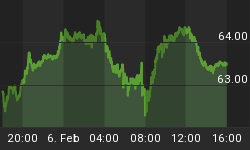The story that commodities are at the centre of China's shadow banking system has gained prominence in recent weeks. No firm evidence has been presented to confirm the scale of these activities, bearing in mind China's State Administration of Foreign Exchange (SAFE) clamped down on these activities last May (http://www.bloomberg.com/news/2013-05-23/china-rule-changes-may-halt-copper-financing-deals-goldman-says.html).
Various commodities, particularly copper but also gold, are allegedly being used as collateral for raising large amounts of cash. The original story concerned onshore leveraged borrowers (http://www.ibtimes.com/copper-china-financing-business-may-cause-further-price-falls-1560678), which was followed more recently by others implicating offshore investors. Put very simply, a commodity-financed deal requires an offshore bank to issue a letter of credit against physical commodity stocks either in transit or held in bonded warehouses, which can be cashed onshore into local currency. This currency is then invested for a significant yield pick-up over the cost of owning the commodity, and is cheaper than funding this carry trade with US dollars.
It cannot be denied that inventive minds will always find a way round government regulations, but it is unclear how we differentiate these trades from normal trade finance, which also requires letters of credit and similar banking arrangements. The thought that SAFE is not competent to regulate commodity-backed lending and is unaware of its scale is difficult to unquestioningly accept. The foreigners prepared to rashly risk their money in a commodity-financed carry trade are a mystery to rational thought.
Instead, we run into a forest of assumptions. The believers in this story cannot identify the changes in bonded stock levels to support their argument. However, the dubious quality of analysis is even more obvious when it comes to gold.
Use of gold for commodity-based financing has to overcome the Chinese authorities' strict controls over the gold market. This is not to be confused with normal on-balance sheet facilities offered by the Shanghai Gold Exchange's member banks. Western analysts often make the mistake of regarding gold simply as another commodity, but signalled by their actions the Chinese government obviously takes a different view. It has effectively cornered the global physical market and simply refuses to let gold leave the mainland, except for licenced jewellery manufacture in Hong Kong and very small amounts in personal possession. The market is tightly controlled through the People's Bank of China, which in turn controls the SGE. The PBOC is extremely unlikely to tolerate the sort of activity claimed, and the licensees know it.
Exaggerating the scale of commodity-financed shadow banking in China supports a bearish stance, because unwinding these deals is expected by the authors of this story to release a flood of physical metal. Coinciding with China's economic slowdown, it has already helped drive copper to four-year lows. For gold it has doubtless contributed to the recent fall in the price, favouring bullion banks unable to cover their physical commitments.
It may be too cynical to suggest that vested interests are behind the promotion of this commodity financing story, but the authors do seem to be ignoring the blindingly obvious. China's copper stocks are backed by real demand and gold is firmly in the grip of the PBOC. China's government and people value physical gold over superabundant fiat currencies and regard it as a hedge against economic uncertainty, not a victim of it.















